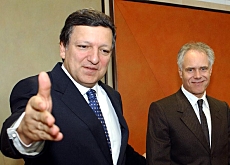Swiss payout to new EU members faces vote

Voters will have the final word on whether Switzerland should pay a financial contribution to the newest European Union countries.
The rightwing Swiss People’s Party announced on Wednesday that it had succeeded in gathering enough signatures to force a referendum on the issue.
The People’s Party said it had collected more than 70,000 signatures from the population – 50,000 are needed for a referendum to go ahead.
The vote is expected to take place on November 26 this year.
Switzerland, which is not a member of the EU, had pledged to pay SFr1 billion ($814 million) into the Union’s so-called cohesion fund, as part of an agreement on a second round of bilateral accords with the organisation.
The contribution, which would be paid over five years, will go to the EU’s ten newest member states – most of them in eastern Europe – to help them develop economically and socially.
But the People’s Party – and other smaller rightwing parties – are challenging the move. The Lega dei Ticinesi and far-right Swiss Democrats Party have managed to collect 10,000 signatures of their own.
However, the People’s Party’s president, Ueli Maurer, was keen to distance himself from them, saying that his party’s action was not about attacking the bilateral accords.
He said the issue was internal and financial. Maurer called for the contribution to be compensated by savings within the federal administration and for the SFr1 billion mark not to be superseded.
Close the door
“We should not open the doors for even more payments,” he added. The People’s Party claims that if a first payment were accepted, there would be nothing to stop the EU from demanding more.
Parliamentarian Ulrich Schlüer said the government had shown itself to be timid and subservient in accepting the deal with Brussels, adding that the EU should give something back if the Swiss accepted to contribute to the fund.
But the move has come in for sharp criticism by a cross-party committee, which includes the three main other parties – the centre-right Radicals and Christian Democrats and the centre-left Social Democrats.
In a statement, the committee said that a no vote on the issue would unnecessarily harm the good relations with the EU and the bilateral accords, both of which the population has approved several times in the last few years.
A recent survey has shown that the electorate is divided over the issue, with only a quarter clearly in favour.
The EU Commission’s president, José Manuel Barroso has already issued a warning to Switzerland that a rejection of the move would send a wrong signal to the new members.
swissinfo with agencies
Laws that have been passed by parliament can be challenged by the public in a referendum.
50,000 signatures must be gathered within 100 days of the publication of a decree.
In a nationwide vote, a referendum needs only a majority of votes. Unlike a people’s initiative, a majority of cantons does not matter for referendums.
Switzerland has been granting financial aid to countries in eastern Europe to help them transform into market economies.
As part of the second set of bilateral treaties with Brussels, non-EU member Switzerland, pledged to provide SFr1 billion over ten years to the ten new EU member states mainly in eastern Europe.
The funding will come mainly from cuts in aid programmes run by the foreign and economics ministries.

In compliance with the JTI standards
More: SWI swissinfo.ch certified by the Journalism Trust Initiative











You can find an overview of ongoing debates with our journalists here . Please join us!
If you want to start a conversation about a topic raised in this article or want to report factual errors, email us at english@swissinfo.ch.